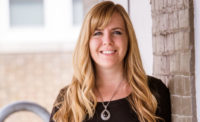Title: Mechanical Project Engineer, Affiliated Engineers Inc.
Age: 36
Educational Experience: Bachelor’s degree in architectural engineering, Kansas State University
Professional Credentials/Accreditations: Professional engineer (P.E.)
Organizational Affiliations/Achievements/Awards: ASHRAE and International Institute for Sustainable Laboratories (I2SL)
What does your day-to-day job entail?
Every day is different but very busy. As a project engineer, I work closely with our clients and engineering teams to develop the mechanical design for high-performance buildings. There are always multiple problems to solve, so my day-to-day entails prioritizing which problems will get my attention and which ones I can delegate or defer.
What caused you to/when did you fall in love with engineering?
I’ve always been fascinated with building design and originally thought I wanted a career in architecture. But, after researching career options within the building industry and realizing my strength in STEM, I discovered the architectural engineering degree option at various universities. While in college, I became very interested in the mechanical/HVAC engineering design emphasis that’s available with the architectural engineering degree, and I haven’t looked back. I love how I’m able to balance my technical skills and creative mind to approach complex building designs.
What has been the most rewarding/proudest aspect of your engineering career?
I’m currently living through the most rewarding part of my engineering career thus far. My current project workload includes an array of net-zero, all-electric, and/or high-performing laboratory building designs. I’m very proud to have developed the skills and expertise to serve as lead mechanical engineer on these types of projects. It's hard to pick a favorite project right now.
What challenges do women face in this profession? Can you give a personal example? Why aren’t there more women in engineering? How can we increase the number of women in engineering?
Women do face challenges in this profession — there are many reasons why these challenges exist, and there’s already a lot of research out there that explains this, which I’ve even covered in past ASHRAE conference presentations. I encourage all engineers, regardless of their gender, to review that research and ask themselves how they can be advocates for women/minorities in the industry. I think some industry professionals are hesitant to be advocates because they think it takes power away from themselves, but that’s not true.
This profession is very male-dominated, which has frequently resulted in historical gender dynamics influencing the workplace. This, in turn, leads to an environment where women are less likely to be treated as equals when it comes to technical talent, which sometimes causes them to be overlooked for opportunities and advancement.
I’ll never forget an experience where leadership in my firm acted as advocates for my expertise and mechanical design to the client. Ahead of a client presentation, they ensured me this specific design item would be presented as my idea to the client and worked together to “echo” support of my design and not “repeat” my statements so that others could take credit for it. It was very powerful.
How many years have you been active in the engineering sector? What’s changed the most in that time? What’s changed the least?
It’s been almost 15 years. There’s always been a conversation around sustainability within the engineering sector, but, recently, the conversation has become much more focused on decarbonization and how to design an all-electric mechanical system. It feels like this topic has become more important in recent years.
One of the things that has changed the least is the amount of pressure deadlines have on our design teams. I do not have any expectations that this will ever change. Nevertheless, it's an important fact for new professionals entering our industry to understand.
What drives/motivates you every day?
Solving problems. How can you be an engineer and ignore an unsolved problem? I especially love finding creative solutions to design challenges that have extra hidden benefits, like added resiliency or improved energy efficiency.
What remains on your engineering bucket list — what do you aspire to do that you haven’t accomplished yet?
I hope to continue to work on one-of-a-kind building designs and advance my role further into project management and beyond. I’d love to end my career with a memorable impact on a long list of successful, high-performing building designs and be known as an advocate for other women/minorities in our industry.
What’s one thing no one knows about you?
I love to sew. During the early stages of the pandemic, I learned how to sew a quilt and have recently started sewing my own garments. I’ve started wearing garments I’ve made into the office and even received a few compliments. It felt really great to respond and let people know I actually made it myself.
List any mentors who’ve helped you succeed and describe precisely how they’ve shaped your success.
I have a long list of mentors, both male and female, who have helped me grow in my career. It’s very heartwarming to look back and think of everyone who’s supported my success.
Julia Keen, my advisor/professor at K-State, was one of my first mentors in the engineering field. She encouraged my involvement in ASHRAE, which has helped me network and connect with so many other professionals. She has also taught me how to manage expectations and realize that just because circumstances in life don’t go perfectly to plan, that doesn’t mean you’ve failed.
Rebecca Welch and Darren Boyle are project managers I’ve worked with at my current firm. They supported me as I developed my technical abilities and encouraged me to develop my engineering, communication, and leadership skills. They also showed me how to lead engineering teams, earn clients’ trust, and handle difficult conversations.
What advice do you have for prospective female engineers considering entering the field?
Good advocates and mentors exist everywhere, so find them and connect with them, and you’ll most likely cross paths with others who are not good advocates. Develop a strategy for how you’ll work with difficult personalities and be wise about who you choose to trust. The engineering field can provide you with a very rewarding career, but it’s okay to go through some rough patches. Those rough patches usually end up making you a more resilient person.





